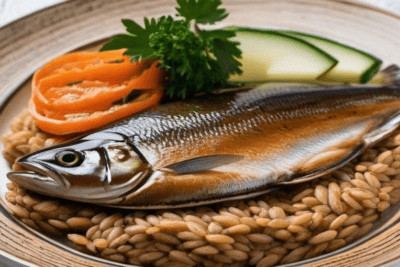
Managing diabetes effectively calls for a comprehensive approach, and diet plays a pivotal role in this strategy. A healthy, balanced diet is not only crucial for overall well-being but also a cornerstone in controlling blood glucose levels and preventing diabetes-related complications.
🔍 Seeking a breakthrough in Type 2 Diabetes management?
Discover our expert insights and innovative approaches on ‘How to Cure Diabetes’.
Click to transform your health journey today!
What you\'ll find in this article?
- What Is a Balanced Diet for Diabetes?
- How to Create a Diabetes-Friendly Eating Plan
- Best Foods to Eat With Diabetes
- Foods to Avoid With Diabetes
- Role of a Dietitian in Managing Diabetes
- Sample Meal Plan for Diabetes Management
- Understanding a Healthy, Balanced Diet for Diabetes
- Creating a Diabetes-Friendly Meal Plan
- Best Foods for Diabetes Management
- Foods to Avoid for Diabetes Control
- Diabetes Diet Tips and Guidelines
- Additional Questions on Managing Diabetes Through Diet
What Is a Balanced Diet for Diabetes?
A balanced diet for diabetes involves a careful selection of foods that contribute to steady blood glucose levels. It includes a variety of nutrient-dense foods like fruits, vegetables, whole grains, and lean proteins. The focus is on minimizing processed sugars and unhealthy fats, while emphasizing fiber-rich foods that aid in blood sugar control.
Portion control is an essential aspect of a diabetic diet, as it helps manage calorie intake and maintain a healthy weight. Moreover, a consistent meal schedule can prevent sudden spikes or drops in blood sugar levels.
Integrating healthy fats such as those found in avocados, nuts, and seeds is vital for heart health, especially since diabetes increases the risk of heart disease. Healthy fats can help moderate blood sugar levels and provide sustained energy.
Explore our specialized services in diabetes care 🌟.
From personalized diet plans to effective exercise routines, we have what you need to take control of Type 2 Diabetes.
Visit our services page now!











How to Create a Diabetes-Friendly Eating Plan
Designing a diabetes-friendly eating plan starts with understanding your body's needs and the way different foods affect your blood sugar. It is often recommended to spread carbohydrate intake evenly throughout the day and pair them with protein or healthy fats for balanced meals.
A dietitian can be a valuable resource in creating a personalized meal plan that aligns with your health goals and preferences. They can also advise on how to read nutrition labels and make informed choices when dining out.
Monitoring your blood glucose levels can provide insight into how your body responds to certain foods and help tailor your diet accordingly.
Remember, there's no one-size-fits-all meal plan for diabetes—what works for one person may not work for another. Therefore, flexibility and personalization are key.
Best Foods to Eat With Diabetes
- Non-starchy vegetables: Spinach, broccoli, and peppers are low in carbs and high in nutrients.
- Whole grains: Options like quinoa, brown rice, and barley have more fiber than refined grains.
- Lean proteins: Chicken, fish, and tofu can help maintain muscle mass and manage hunger.
- Fruits: Berries, oranges, and apples should be consumed in moderation due to their sugar content.
- Legumes: Beans and lentils provide protein and fiber, which help regulate blood sugar.
These foods can be part of your meals and snacks, helping to provide balanced nutrition throughout the day.
Foods to Avoid With Diabetes
Some foods can exacerbate blood sugar fluctuations and should be limited or avoided altogether. High-carbohydrate foods like white bread, pastries, and sugary drinks can lead to spikes in blood glucose. Trans fats, found in some margarines and processed snacks, are also detrimental to heart health.
It is advisable to reduce intake of red meat and processed meats, which have been linked to increased risks of heart disease and diabetes complications. Instead, opt for plant-based sources of protein or lean animal proteins.
Role of a Dietitian in Managing Diabetes
A dietitian plays a crucial role in diabetes management by providing expert nutritional guidance tailored to individual needs. They can help navigate the complexities of glucose management, weight control, and dietary adjustments required for managing chronic conditions.
Dietitians can also assist in developing coping strategies for dietary changes, ensuring that the transition to healthier eating habits is sustainable and effective. Their support can make a significant difference in achieving long-term health goals.
Sample Meal Plan for Diabetes Management
A sample meal plan for diabetes management might include a breakfast of oatmeal with berries and almonds, a lunch of grilled chicken with a variety of vegetables, and a dinner featuring grilled fish with quinoa and steamed broccoli.
Snacks can consist of Greek yogurt, a small apple with peanut butter, or a handful of nuts. The key is to ensure meals and snacks are balanced, containing portions of carbohydrates, protein, and healthy fats.
Understanding a Healthy, Balanced Diet for Diabetes
Understanding a healthy, balanced diet for diabetes involves recognizing the impact of dietary choices on blood glucose levels and overall health. It's not just about the foods you eat, but also when and how much you eat them.
Creating a Diabetes-Friendly Meal Plan
Creating a diabetes-friendly meal plan requires taking into account personal taste preferences, lifestyle, and nutritional needs. It's a collaborative process that often involves healthcare providers to ensure the plan is effective and manageable.
Best Foods for Diabetes Management
Best foods for diabetes management typically include nutrient-rich, low-glycemic-index foods that promote stable blood sugar levels. Incorporating a variety of these foods helps maintain a balanced and enjoyable diet.
Foods to Avoid for Diabetes Control
Foods to avoid for diabetes control are those that can cause rapid increases in blood sugar or contribute to weight gain and other health issues. Identifying these foods and finding substitutes is key to managing diabetes.
Diabetes Diet Tips and Guidelines
General diabetes diet tips and guidelines include eating regular meals, paying attention to portion sizes, choosing high-fiber foods, and staying hydrated. These guidelines help create a foundation for healthy eating habits.
Additional Questions on Managing Diabetes Through Diet
What Is a Healthy Diet for a Diabetic Person?
A healthy diet for a diabetic person consists of a balance of fruits, vegetables, whole grains, lean proteins, and healthy fats. It limits processed sugars and unhealthy fats, focusing on foods that have a low glycemic index.
Consistency in eating habits and attention to portion sizes help maintain blood glucose levels within target ranges and support overall health.
What Foods Can Diabetics Eat Freely?
Diabetics can eat non-starchy vegetables like leafy greens, broccoli, and carrots freely. These foods are low in calories and carbohydrates but high in vitamins, minerals, and fiber.
Foods like lean meats, fish, eggs, and low-fat dairy products can also be included as part of a balanced diet, but portion control is important.
What 10 Foods Should Diabetics Eat?
Here are ten foods that diabetics should include in their diet:
- Leafy green vegetables
- Whole grains
- Beans and lentils
- Fatty fish like salmon
- Berries
- Chia seeds and flaxseeds
- Nuts and nut butters
- Avocados
- Plain Greek yogurt
- Garlic
What Is a Normal Meal for a Diabetic?
A normal meal for a diabetic should include a balance of macronutrients: carbohydrates, proteins, and fats. An ideal plate might be half filled with non-starchy vegetables, a quarter with lean protein, and a quarter with a whole-grain or starchy vegetable.
The meal should be flavorful and satisfying, using herbs and spices instead of salt or sugar for seasoning.
As part of our commitment to providing valuable information, we have selected a video that further explains the relationship between diet and diabetes management.
In conclusion, a healthy, balanced diet plays a crucial role in managing diabetes. It's important to consume a variety of nutrient-dense foods, monitor portion sizes, and maintain a consistent eating schedule. By doing so, individuals with diabetes can improve their blood glucose control and overall health.
✨ Other articles you might be interested in:



